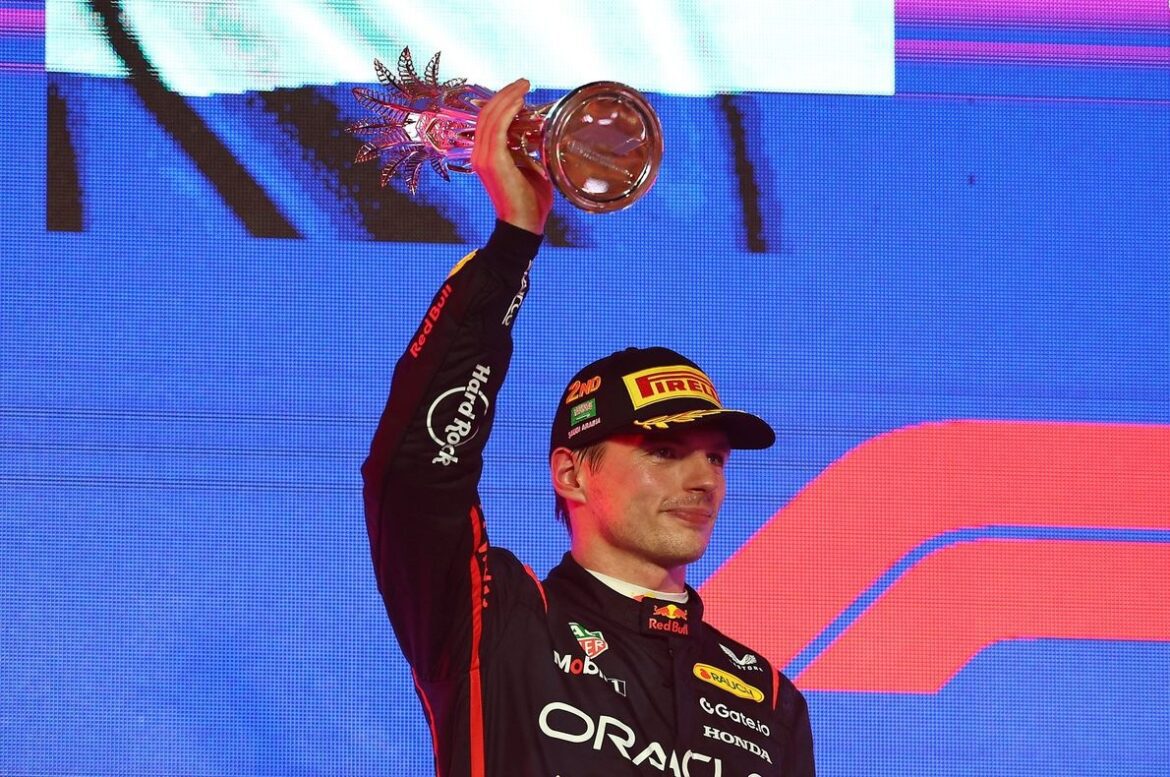Max Verstappen, the renowned driver for Red Bull Racing, chose to remain tight-lipped regarding a controversial incident during the opening lap of the Saudi Arabian Grand Prix, where he lost a potential victory. The Dutch racer emphasized that discussing the matter could lead to repercussions from the FIA, hinting that “people can’t handle the truth.” Starting from pole position in Jeddah, Verstappen faced immediate competition from Oscar Piastri, who ultimately clinched the race victory. The situation escalated when Verstappen cut Turn 2, resulting in a five-second time penalty from the race stewards.
During the race, Verstappen found himself trailing Piastri after the only pit stop and finished 2.843 seconds behind the McLaren driver at the race’s conclusion. Upon receiving the news about his penalty through team radio, Verstappen modified his well-known catchphrase, expressing his frustration with a colorful expletive.
When questioned about the incident in the post-race press conference, Verstappen was noticeably reserved. “Yeah, the start happened, Turn 1 happened, and suddenly it was lap 50,” he remarked, reflecting on how quickly the events unfolded. He further explained, “The issue is that I cannot express my opinion on it because I might also face penalties. It’s best not to speak on the matter.” Verstappen’s hesitance stems from a desire to avoid any potential backlash from the FIA, indicating, “I think it’s advisable not to discuss it. Anything I say could land me in trouble.”
The stewards provided a detailed rationale for their decision, stating they had thoroughly reviewed positioning data, video footage, timing, telemetry, and in-car video evidence. They concluded that Piastri’s car was at least level with Verstappen’s vehicle on the inside as they approached the corner. The stewards asserted, “Indeed, car 81 was alongside car 1 at the apex. According to the Driver’s Standards Guidelines, it was car 81’s corner, and he deserved room.”
George Russell, who started the race in third position, expressed surprise that Verstappen did not simply yield the position to Piastri after re-entering the track. Red Bull team principal Christian Horner and advisor Helmut Marko publicly voiced their dissatisfaction with the stewards’ ruling, highlighting the tension surrounding the decision.
In recent times, Verstappen has been less vocal with the media, particularly after facing penalties for his outbursts during press conferences, notably following his remarks at the Singapore Grand Prix last year. When asked if he felt constrained in expressing his opinions about such events, he replied, “It’s simply the world we live in. You can’t fully share your thoughts because they may not be well-received, or perhaps people can’t handle the unfiltered truth.”
Verstappen continued, stating, “For me, honestly, it’s often easier not to say too much. It saves time since we already have so many obligations. That’s just the way things are evolving.” He acknowledged that while he is aware that he must avoid swearing in public forums, he also feels restricted in his ability to voice criticism. “Let me pull out the guidelines: there are many lines regarding what you can and cannot express in press conferences,” he noted.
Given this context, Verstappen expressed that it is simply safer for him not to engage in discussions about potentially contentious issues, emphasizing, “You can easily find yourself in trouble, and I don’t think anyone wants that.” He added that his words often get misconstrued when shared on social media platforms. “It’s a reflection of the current world and the role of social media. I prefer to keep my comments minimal because sometimes, what I say can be misinterpreted or taken out of context. So, really, it’s better to limit my words,” he explained.
Verstappen lamented the heightened sensitivity surrounding public commentary. “Everyone is overly sensitive about everything these days. And with the current atmosphere, we can’t really voice our criticisms anyway. So, honestly, less talking suits me just fine!”
As Verstappen navigates these challenges in the fast-paced world of Formula 1, his approach to communication reflects a broader trend within professional sports regarding the management of public personas, media interactions, and the potential fallout from candid remarks. Balancing the demands of racing with the scrutiny of the media and fans can be a delicate endeavor, especially in a sport where split-second decisions can have significant consequences.
This incident serves as a reminder of the complex dynamics at play in Formula 1, where not only the racing strategies and performance on the track are scrutinized, but also the words spoken off the track carry weight. As drivers like Verstappen navigate their careers, they must remain cognizant of how their statements can impact their reputations and relationships within the sport.
In the highly competitive atmosphere of Formula 1 racing, the stakes are always high. Drivers like Verstappen are not just athletes; they are also public figures whose words and actions are closely monitored. This pressure can lead to a reluctance to engage openly with the media, as athletes strive to maintain their focus on racing while managing a public image.
The Saudi Arabian Grand Prix incident highlights the importance of communication in the sport, both on and off the track. Verstappen’s decision to withhold his opinions on the matter reflects a growing awareness among athletes of the potential repercussions of their words. As social media continues to play a dominant role in shaping public perception, drivers must navigate this landscape with care.
In summary, Max Verstappen’s experience during the Saudi Arabian Grand Prix underscores the intricate relationship between racing, media interaction, and public perception in Formula 1. As he continues to excel on the track, his approach to communication will likely evolve, reflecting both the challenges of the sport and the expectations of his audience.
